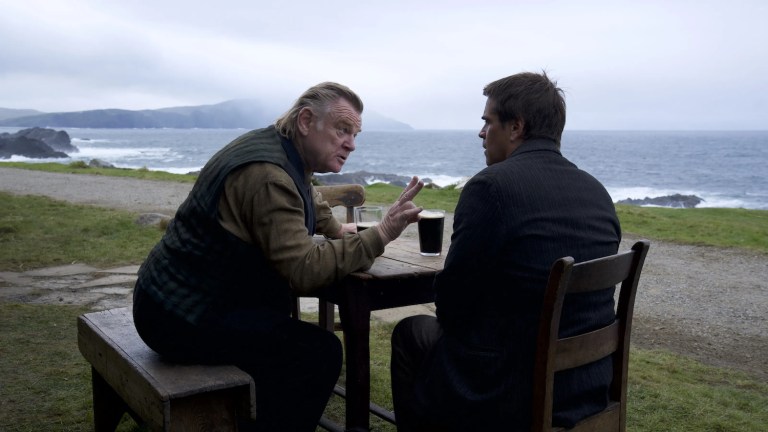Why the Tragedy of The Banshees of Inisherin Is So Funny
The lives of the characters in The Banshees of Inisherin are full of despair, yet there's a reason we cannot help but laugh.

This article contains spoilers for The Banshees of Inisherin.
With nine Academy Award nominations, Martin McDonagh’s tragicomedy The Banshees of Inisherin is practically guaranteed to take home some amount of Oscar gold, particularly in the Best Original Screenplay category. It’s a strong contender for Best Picture too. This story about the friendship between two men coming to an abrupt end may seem small in scale, but it pulls off something huge: making a larger-than-life existential crisis absolutely fecking hilarious. The humor is darker than a pint of Guinness and it haunts. Why is that?
Colin Farrell stars in the film as Pádraic, a dull but well-meaning man who lives on a small fictional island off the coast of Ireland in 1923 and at the height of the Irish Civil War. Pádraic loves his sister Siobhán (a feisty, expressive Kerry Condon), his little donkey Jenny, and his daily 2pm drink at the village pub with his best mate, Colm (Brendan Gleeson). He also loves to think of himself as the nicest person on Inisherin, so he’s absolutely floored when Colm suddenly ignores him and ultimately admits that he just doesn’t want to be friends with Pádraic anymore.
It’s very easy to sympathize with Pádraic and Farrell’s agitated face, thick dark eyebrows perpetually up in befuddlement, not unlike a big dog who only wants to please. As Colm, Best Supporting Actor nominee Gleeson, previously Farrell’s co-star in McDonagh’s 2008 hitman dark comedy In Bruges, is an intimidating, immovable stormcloud whose commitment to brutal honesty makes The Banshees of Inisherin begin more like a horror film for the socially anxious. What if your friends never liked you? What if you are a stupid bore and no one told you?
The mystery behind the men’s childish feud is revealed quickly, and it’s merely an inciting incident for a larger story about personal wars between perceived nicety and nature, faith and country, life and death. But Colm, it seems, might not actually hate his best friend at all…until their civil war in miniature grows violent. Colm’s sudden ire is because he’s really fixated on his own death and blames Pádraic’s boring drunk-speak for distracting Colm from his desire to create music that might offer him a chance at immortality.
It’s a wild surprise, played by an actor who never looks out of place in a good gangster flick, has a secret poetic dream, but what makes the whole scenario so funny is the self-delusion Colm and Pádraic display. Poor Pádraic cannot stop needling at Colm for a satisfying answer, even though it’s obvious to everyone else that there is no satisfying answer for something like this. It’s certainly not sane of Colm to cut off his own fingers to spite someone else, but perhaps Colm actually seeks relief from the pressure to create a song worthy of Mozart in the first place. He can’t even try to be great without his fiddle, but he can’t play at all without his fingers; Pádraic is Colm’s only real friend and also Colm’s easiest deflection.
When Colm declares that he wants to be remembered long after his death, like Mozart, Pádraic says he preferred Colm when he was simply “nice.”
“No one ever remembers the people who were nice,” Colm responds, as the camera cuts to Pádraic standing in front of a painting of Jesus. It’s a brilliant, subtle visual gag and foreshadows suffering yet to come.
But that’s why it’s so funny; we see these characters as they cannot, a point McDonagh makes again and again to humorous and ultimately tragic ends. Very few people, in fact, see themselves as they really are, instead relying on others’ opinions. Being a “nice” person has a lot of value for Pádraic and the good, “normal” folk of Inisherin, even if they’re also the kind of small-town “nice” people who know everyone else’s business yet pretend not to see a father repeatedly beat his son black and blue. Pádraic is only as nice (or dull) as his friends and neighbors perceive him to be.
Pride propels both men to escalate their feud until other villagers of Inisherin are pulled in and tragedy, it seems, must befall the most innocent among them, namely Dominic, a naive young man who has seen the worst in humans thanks to his vile father, the local policeman. Barry Keoghan (The Batman, Dunkirk) is skilled at playing “dim” young men with a pervy streak, but here it’s the flipside of his character in The Killing of a Sacred Deer—where he also tormented Colin Farrell. Dominic understands a lot, maybe more than he lets on, or drinks too much to hide, and he’s vulnerable and unfairly maligned as the village idiot.
But McDonagh makes a case for a fool being the only person who can understand life’s cruel absurdities so clearly.
Pádric and Colm are fools, too, in the Shakespearen sense, like the gravediggers of Hamlet or Feste in Twelfth Night. The audience relaxes with humor, maybe a tinge of superiority over these clowns, until one thinks about how deep their jests cut to the heart of universal anxieties. They debate good and evil, and their place in the status quo of their world, but an epiphany is always just out of reach.
Pádraic is probably not “one of life’s good guys,” as he’s known for being a bit of a mean drunk. He’s quick to point out others’ hypocrisy, quick to assert that he’s smarter than Dominic (surprise: he’s not), and his grudge with Colm ultimately leads him to act casually cruel. Meanwhile Colm is so self-important and stubborn, he sends even Inisherin’s mild-mannered priest into a rage, as he chases Colm from a confessional without absolving him of his sins, hilariously threatening him with eternal damnation if Colm should die: “You’ll be pure fucked!” Colm, who can only be rescued from his despair by entertaining himself with literal self-destruction, seems fine with that.
Death’s presence looms over the island, even if the war seems far away. Inisherin’s resident witchy widow, Mrs. McCormick, with her black dress and a sheep hook instead of a scythe, bears an uncoincidental resemblance to the Grim Reaper in The Seventh Seal. The ornery nutbag dispenses gossip and dark prophecy with equal glee, and much like the Banshee of Colm’s thwarted song, she portends deaths, of which there are a few. She does not scream, not like Siobhán, the only other woman of real note in the story, and who is clearly over the pointless grudges of the small-minded men around her. She yearns to be brave enough to flee for the hope of a better life on the mainland. Mrs. McCormick only observes, amused, as these sad, small mortals wrestle with their nature. She’s in on the joke; we’re cackling with her because we, too, know this story can only end with death in triumph.
The Banshees of Inisherin feels more theatrical than cinematic, with its small cast and beautiful but remote setting that is unmistakably Irish in its gorgeous dreariness. Inisherin is also a kind of mystical Anywhere, like the roadside in Samuel Beckett’s Waiting for Godot, another great tragicomedy about two existential fools. Gunshots thunder in the distant mainland where the Irish Civil War is at its peak, but the folk of Inisherin care little for it outside of fodder for idle chatter.
They’re more concerned for the state of their souls.
By its final act, The Banshees of Inisherin has set off all those Chekhov’s guns it displayed in the beginning, as some embrace their fate to varying degrees of success, and others choose denial. When Pádraic is alone, entirely alone, he’s stripped of his good guy veneer and pushed too far to return. Colm is also trapped by his failures at film’s end, and if he has escaped literal death, it’s only for the moment. And that’s true of every living thing, really. The men are no longer friends, which is impossible after the bad things they’ve done to each other, whether by accident or design, but, funnily enough (to those of us who didn’t have their beloved pet die or their home burned down), Colm and Pádraic’s reunion sees them closer than ever, just… as enemies. But it’s not even as tidy a reversal as that. After everything, Pádraic will still watch Colm’s dog when it’s needed, and the messiness of their new relationship towards one another and their home is bittersweet. It’s Inisherin, after all—they can’t allow themselves to leave, and there’s no one on the island left to them, really, but each other.
They still can’t quite see it, but audiences can and that’s the final joke, lingering over the movie. Do any of us know ourselves any better than Colm and Pádraic, or are we all fools too?
The Banshees of Inisherin is infinitely rewatchable and infinitely relatable to anyone who has ever stared at themselves—and at the world—for too long and despaired. God may not care about little donkeys and village idiots, but even the most humble among us can make each other’s lives easier, be it by a small jest or a simple act of kindness. That genuine niceness is something that can be remembered forever—or until death and even long after the Banshee has sought its amusement somewhere else. In its bloody but warmhearted way, McDonagh’s film is already ahead of the game.
Just don’t tell Colm Doherty that his magnum opus wasn’t nominated for Best Original Song.
The Banshees of Inisherin is streaming on HBO Max now.
